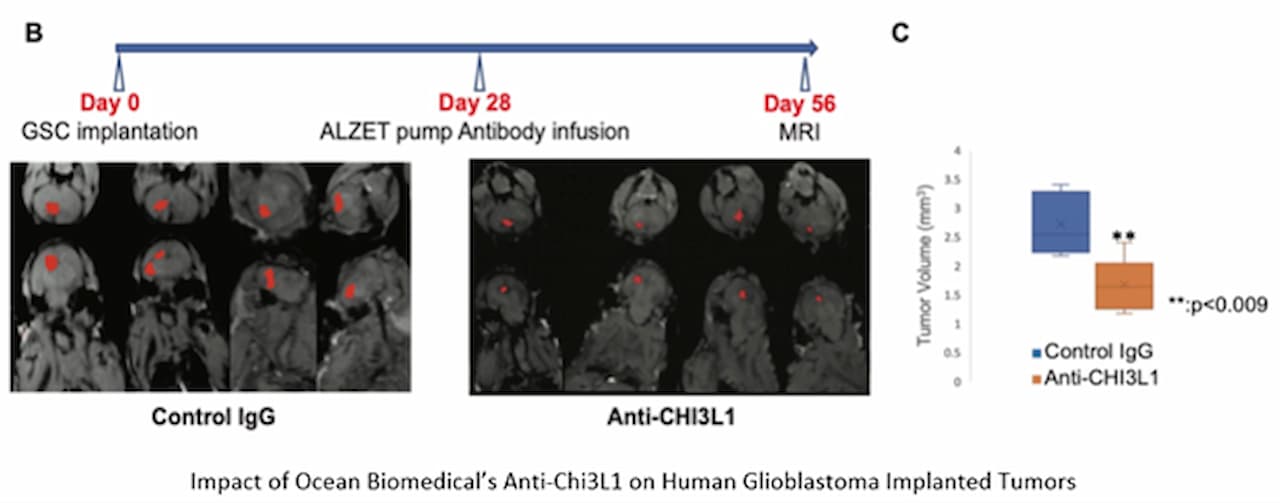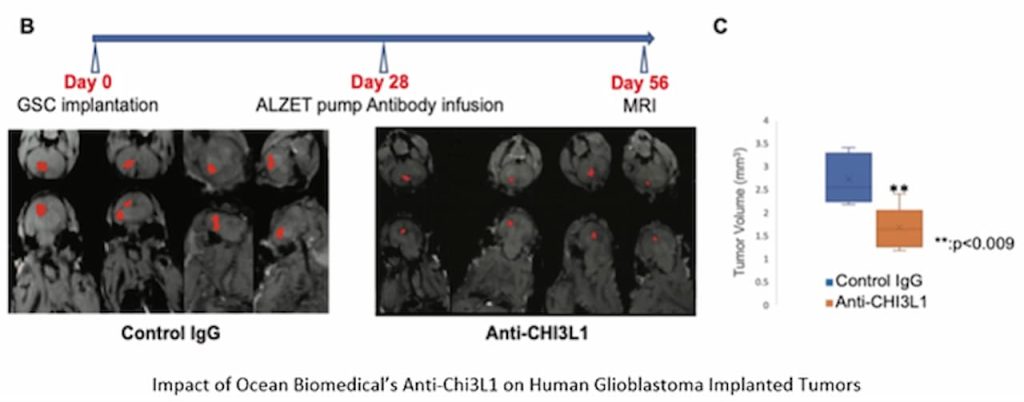“This is a completely new way of thinking about how to treat this tumor. Glioblastoma is so challenging partly because the cells adapt to the environment constantly – but if you block Chi3L1 they can’t seem to acquire the more aggressive mesenchymal phenotype. It gives us a clear path forward to being able to address glioblastoma with this novel approach,” said Dr. Nikos, Director of the Laboratory of Cancer Epigenetics and Plasticity, and the last author on the paper.
Findings
In two different study approaches, treatment with anti-Chi3L1 antibody in vivo resulted in over 60% reduction of human glioblastoma growth and significant survival benefit. This represents a medical breakthrough in understanding how the most aggressive glioblastoma tumors are formed, and how patients diagnosed with this challenging disease might possibly be treated.

(Source: Ocean Biomedical, Inc.)
“There are so many challenges around finding effective treatments for glioblastoma, and we are working to advance this new approach that we believe can give hope to patients with glioblastoma, and can also be extended to potential therapeutics for non-small cell lung cancer, melanoma, and other forms of cancer,” said Ocean Biomedical’s chairman and co-founder Dr. Chirinjeev Kathuria.
The new data builds on prior discovery work by Dr. Jack Elias, former Dean of Medicine and Biology, and SVP for Health Affairs at Brown University. Over the last year, Dr. Elias has published discoveries about the roles of CHI3L1 in the pathogenesis of a wide variety of cancers. He has also previously revealed discoveries that demonstrate that the metastasis of malignant melanoma cells can be inhibited by targeting immune checkpoint inhibitors such as PD-1 and CTLA-4 and their ligands.
“We are excited that, step by step, we are gaining a deeper understanding of the multiple effects that CHi3L1 has in oncogenesis. This antibody is very effective – every time we put it into an appropriate modeling system, we get exciting results such as the findings in these two human-mouse GBM studies. Glioblastoma is a major area of unmet medical need, and these new studies are highly encouraging because they open the door to a new way of treating this devastating cancer,” said Dr. Elias.
The Chi3L1 Factor
Prior research has established that elevated Chi3L1 levels are associated with many cancers, including glioblastoma, and may be targeted therapeutically. Recent studies from Ocean Biomedical have demonstrated that CHI3L1 is a critical regulator of a number of key cancer-causing pathways, highlighting its ability to inhibit tumor cell death, its inhibition of the expression of the tumor suppressors P53 and PTEN, and its stimulation of the B-RAF protooncogene.
“We are pleased to see our glioblastoma candidate being validated by Dr. Tapinos and his team, and we hope this will be another step in moving us towards filing an IND for Glioblastoma,” said Elizabeth Ng, CEO of Ocean Biomedical.
Most recently, Dr. Elias’ research team has discovered that CHI3L1 is a ‘master regulator’ of immune checkpoint inhibitors, including key elements of the PD-1 and CTLA4 pathways. In accord with the importance of these pathways, Ocean has also generated antibodies: 1.) a monoclonal antibody against CHI3L1, 2.) bispecific antibodies that simultaneously target CHI3L1 and PD-1, and 3.) a new bispecific antibody that simultaneously targets CHI3L1 and CTLA4.
“We’re proud to be collaborating with some of our nation’s top scientists to move these important programs forward, and we are confident that each advancement will add long-term value for our shareholders and for the doctors and patients who need innovative new treatments,” commented Suren Ajjarapu, a director of Ocean Biomedical.
EF Hutton Ups Target
Separately, EF Hutton in a research report said it is increasing the price target on Ocean Biomedical’s shares to $17 from $10. Earlier, Ocean Biomedical had filed an S-1 registration statement for around 12.1 million shares for various shareholders and warrant holders and also provided an updated share count of 33.849 million shares.
